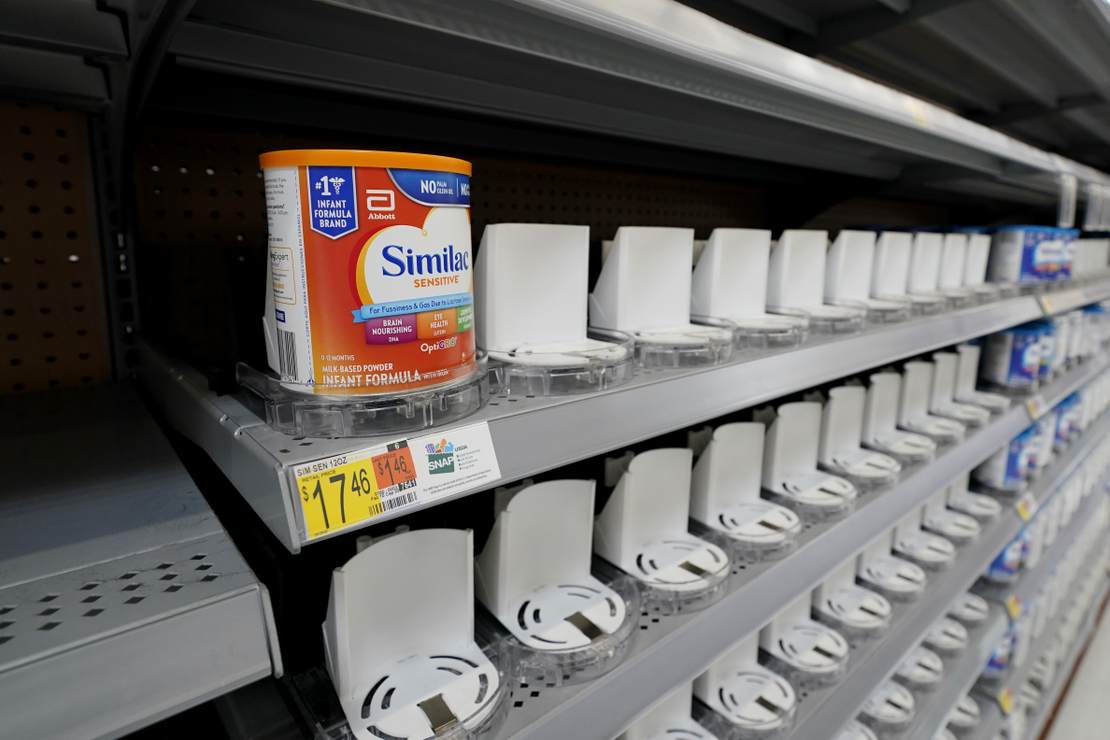
A White House website didn’t solve it. Airlift flights from Europe didn’t fix it. Nine months after the New York Times first reported the shortages and three months after Joe Biden acknowledged he finally learned of it, retail inventory of baby formula dropped to its lowest level in July, the Wall Street Journal reports this morning:
Availability of powdered formula products in U.S. stores earlier this month dropped to the lowest level so far this year, with about 30% of products out of stock for the week ended July 3, according to the market-research firm IRI. While availability improved slightly last week, out-of-stock levels remain higher than in recent months, and shortages remain acute in states including Alaska, Utah and Wyoming, IRI data showed.
At the same time, consumers are finding fewer choices of brands, sizes or formats of formula on grocery-store shelves as the variety of available products shrinks. U.S. supermarkets over the four weeks ended June 26 sold an average of 11 different formula products per store weekly, according to IRI, compared with a weekly average of 24 from 2018 to 2021.
Keith Milligan, controller of Piggly Wiggly stores in Georgia and Alabama, said his stores are carrying five of the 30 formula products they typically sell, compared with about 10 in late spring. Store shelves aren’t empty, but have many gaps, Mr. Milligan said, and customers are purchasing what is available.
“It has not improved at all,” Mr. Milligan said of Piggly Wiggly’s formula supply.
What about Joe Biden’s touted airlifts of supply from Europe? That may have helped take the edge off, but that’s all. The amount transported covers less than a week of US consumption:
In May, the White House directed the Defense Department to use its contracts with commercial air-cargo lines to bring formula from other countries into the U.S. The effort, known as Operation Fly Formula, by July 17 will have flown in baby formula on nearly 50 flights from places such as Europe, Australia and Mexico, and transported the equivalent of more than 55 million 8-ounce bottles to the U.S., according to the administration.
READ RELATED: Gallup: Americans' confidence in the news media is at an all time low
U.S. consumers typically purchase enough powdered formula to make about 65 million 8-ounce bottles a week, according to IRI data.
What gives? First off, Abbott hasn’t gotten its production facility back on line yet after having it shut down by the FDA for months over a contested contamination claim. They restarted production recently, but storms in Michigan produced flooding that required Abbott to close it down again. They are now producing a relatively low output of a badly needed specialty formula for infants with digestive problems, the WSJ reports, but won’t restart Similac production at scale for another several weeks. Abbott is the prime contractor for the food-stamp program’s baby formula program, which means their absence is hitting low-income families hardest.
The group that manufactures Enfamil says they are trying to ramp up domestic production and plan to import more formula from Europe. The problem with that is that their import aims — 66 million 8-ounce bottle equivalents — is again only a week’s worth of US consumption. And that import boost will get stretched out over the next four months, making the market impact minimal.
Joe Biden made a big deal about the airlifts and his use of the Defense Production Act, but the former was more show than substance and the latter even more so. The problem wasn’t a lack of desire to produce, but a lack of capacity and a difficult time getting the precursors. The futility of that action — which Biden took after first trying a website for a response — has been made clear in the two months since Biden signed the DPA order. The existing supply-chain crises, which have largely remained unresolved, is hampering formula production and the DPA isn’t going to solve those issues.
Finally, the Biden administration could have taken immediate steps to prevent this issue from getting worse once it appeared in October, and especially after the FDA shut down the Abbott facility in late January. Biden and his team could have lifted the tariffs on imports of baby formula and ordered the FDA to approve the labeling of European-produced formula, a point that has nothing to do with its nutritional value or safety. They could still take these steps, which would then allow those manufacturers to regularly ship their product to the US for sale rather than have the US Air Force transport it on an emergency basis to provide a drop-in-the-bucket level of assistance to hungry infants and panicked parents.
Instead, Biden’s doing as little as possible while hoping no one notices that he hasn’t solved the crisis, or even dented it. That’s been Biden’s modus operandi for eighteen months now, and … it’s working about as well as his website solution to the baby formula crisis.
Source:





